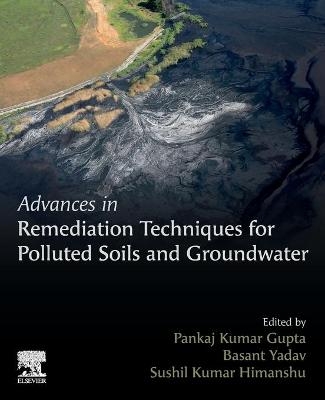
Advances in Remediation Techniques for Polluted Soils and Groundwater
Elsevier Science Publishing Co Inc (Verlag)
978-0-12-823830-1 (ISBN)
Dr. Pankaj Kumar Gupta is a Ramanujan fellow ?at the Indian Institute of Technology (I.I.T.) Delhi, India and post-doctoral fellow in the faculty of environment, University of Waterloo, Canada. His current research focuses on investigating the behavior of pollutants in peatlands (Canada) and mineral aquifers (India) under dynamically fluctuating groundwater table conditions. Majority of his works focus on two areas: (1) understanding the occurrence of bio-geo-chemical interactions when pollutants migrate into groundwater systems; and (2) developing remediation strategies. Dr. Gupta hsa in-depth experience in incorporating novel technologies to map soil-water systems in more than 30sites in India. He is passionate about interdisciplinary research and teaching to understand multi-scale interactions between different components of the subsurface environment, especially the soil- groundwater-pollutant-microbes system. Dr Basant Yadav Ph.D. (Civil Engineering), is a postdoctoral fellow in Water Science Institute of Cranfield University (UK), working on groundwater quality and quantity management. Specific focus of Dr Yadav’s research includes flow and transport processes in ground water and in the vadose zone; hydroinformatics; managed aquifer recharge. Dr. Yadav's research emphasizes the Integration of Experimental, Numerical and data based modeling approaches for the better and efficient management of the groundwater quantity and quality. His work uses a range of numerical, statistical, and stochastic modeling approaches and experimental work to analyze the fate and transport of contaminant in saturated and unsaturated zones. Dr. Yadav is an agricultural engineer and received his M.Tech in hydrology jointly from Indian Institute of Technology Roorkee (India) and Technical University Stuttgart (Germany). He did his PhD from Indian Institute of Technology Delhi (India) on ‘Application of soft computing techniques in water quality and quantity modeling’. He was awarded prestigious National Postdoctoral fellowship (NPDF) in 2017 to work on his postdoctoral project in Indian Institute of Science Bangalore, India. He has received scholarships like DAAD (Germany), MHRD (India) for his masters and PhD work. He has authored/co-authored more than fifteen research publications in high impact journals such as journal of Hydrology, Hydrological Science, Journal of Environmental Engineering, Journal of Hydrologic Engineering, and Measurement Journal. Dr. Yadav has presented his work in highly reputed meeting like AGU (December- 2014, USA), AOGS (August-2017, Singapore), JpGU (June-2018, Japan). He is a member of the American Geophysical Union (AGU), Asia Oceania Geosciences Society (AOGS) and Japan Geoscience Union (JpGU). He is the reviewer of high repute journals like Science of Total Environment, Hydrological processes, Journal of Hydrology, Journal of Hydrologic Engineering, Water Resources Management, ISH Journal of Hydraulic Engineering and Journal of Hydroinformatics. Dr. Sushil Kumar Himanshu is an assistant professor in the Department of Food, Agriculture and Bioresources, School of Environment, Resources and Development, Asian Institute of Technology, Pathum Thani, Thailand. His scientific and professional interests are in the areas of precision farming, climate-resilient agricultural systems, cropping system modeling, and applications of remote sensing, GIS and machine learning in agriculture. Dr. Himanshu' has published more than 65 research papers in scientific international journals, two edited books, 11 book chapters, more than 45 conference proceedings and abstracts, and eight articles.
1. Water is life: Implications of multi-pollutants around the globe
2. Subsurface pollution by geogenic, industrial, and emerging pollutants
3. Soil contamination: efficacy of fertilizer, sawdust and horse manure application as a treatment technique for oil-polluted soil in the tropics
4. Groundwater pollution and Climate change: Advances in interlinking tools
5. Advances in modeling and laboratory analysis for multi-phase flow in porous media
6. Large scale (2D/3D) laboratory experiments and numerical modeling to assist PAHs behaviours in the subsurface
7. Heavy metals and metalloids in subsurface environment: environmental and health hazards and bioremediation strategies
8. Flow and movement of gaseous pollutants in the subsurface: CO2 and CH4 dynamics at a CCS site
9. Density driven flow, saline water intrusion- Consequences and Current status
10. Fate of selenium and naturally occurring materials in soil and groundwater: role of isotopic techniques in assessment and remediation
11. Impacts of climatic variability on subsurface water resources and nitrate-N movement
12. Advancement in groundwater quality modeling: Conceptual and Computational models
13. Simulation-Optimization Approaches in remediation system design
14. Estimation of groundwater recharge and its impacts on groundwater quality
15. Evaluation of Machine Learning-Based modeling approaches in groundwater quantity and quality prediction
16. Remote sensing and GIS application in contaminant mapping and prediction
17. Uncertainty in groundwater quality modeling: Causes and impacts
18. A comparative study of Artificial Neural Network and Genetic Algorithm Model for the prediction of Fluoride in the Groundwater: A case study of Rajasthan, India
19. Assessing the risks of interaction between the natural water table and on-site wastewater treatment systems
20. Soil erosion risk assessment over an agricultural watershed
21. Managed aquifer recharge structures for fluoride remediation in India
22. Column Adsorption Studies for the Removal of Chemical Oxygen Demand from Fish Pond Wastewater using Waste Alum Sludge
23. Micro-plastic in the subsurface: extraction and characterization from sediments of River Ganga near Patna, Bihar
24. Development in microbial techniques for management and remediation of PPCPs polluted sites
25. Riverbank infiltrations- sustainable tool for rural faecal contaminations
26. Economical risk analysis for Management and Remediation of polluted sites
27. Evaluation of health risk analysis for industrial pollutants
28. Understanding the Hydrogeology of Polluted Sites
29. Groundwater Policy- What need to modify?
30. Applicability, Implications and Development for Treatment of Polluted Groundwater
| Erscheinungsdatum | 02.11.2021 |
|---|---|
| Sprache | englisch |
| Maße | 191 x 235 mm |
| Gewicht | 810 g |
| Themenwelt | Naturwissenschaften ► Biologie ► Mikrobiologie / Immunologie |
| Naturwissenschaften ► Chemie | |
| Technik ► Umwelttechnik / Biotechnologie | |
| ISBN-10 | 0-12-823830-5 / 0128238305 |
| ISBN-13 | 978-0-12-823830-1 / 9780128238301 |
| Zustand | Neuware |
| Haben Sie eine Frage zum Produkt? |
aus dem Bereich


